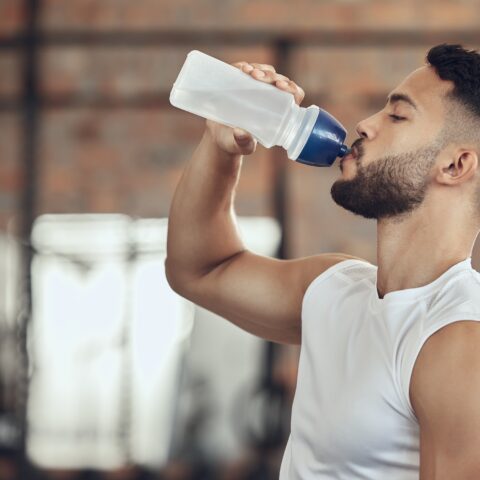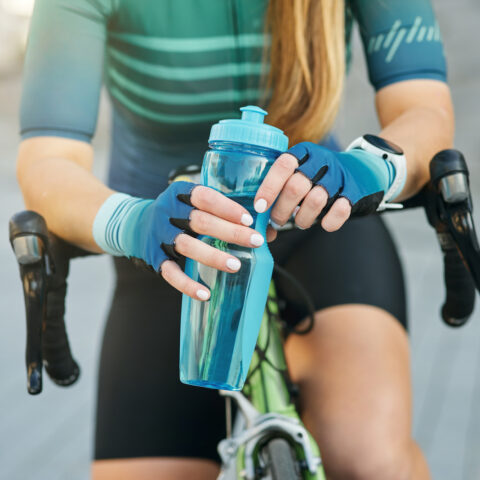Why The Paleo Diet Helps Athletic Performance

After Joe Friel and I co-authored The Paleo Diet for Athletes, many athletes adopted The Paleo Diet®, or a personalized version, to help their performance. The Paleo Diet helps athletes—and anyone with an active lifestyle—to increase muscle mass, reduce body fat, and exercise more effectively. There are several science-backed reasons that The Paleo Diet helps athletic performance.
Here are four major reasons why science says The Paleo Diet is ergogenic (enhances athletic performance), and how you can use it to enhance your own performance from work to play.
1. The Paleo Diet Provides Plenty of Muscle-Building Amino Acids
The Paleo Diet recommends high-quality protein sources, mostly from unprocessed natural meats and seafood. These high-quality protein sources are the richest source of branched-chain amino acids (BCAA) like valine, leucine, and isoleucine. Branched-chain amino acids specifically are potent stimulants for building and repairing muscle.
For athletes, it’s best to consume protein after exercise, as that’s when these amino acids work best when consumed in the post-exercise window. In other words, you should be eating high-quality meats after key workouts.
Lean meats and fish are far and away the greatest source of BCAA. A 1,000-calorie serving of lean beef provides 33.7 grams of BCAA, whereas the same weight of whole grains supplies just 6 grams. In fact, there are no plant-based protein sources that come close to fulfilling the body’s needs for protein. And athletes must take special care to avoid dairy or legume-based protein sources like whey, soy, or pea proteins as they can cause a variety of health problems specifically for athletes.
Because many endurance athletes focus on starches (breads, cereals, pasta, rice, and potatoes) and sugars at the expense of meats, particularly following a hard workout, they get very little muscle-building BCAA in their diets.
By consuming high amounts of animal protein (and hence BCAA) along with sufficient carbohydrates, athletes can rapidly reverse the natural breakdown of muscle that occurs following a workout and thereby reduce recovery time and train at a greater intensity at the next session.
2. You’ll Neutralize Your Blood Acidity
Eating Paleo also prevents muscle protein breakdown because it produces a net metabolic alkalosis.
What does this mean, exactly? All foods, upon digestion, report to the kidneys as either acidic or alkaline (basic). The typical American diet is net acid-producing because it’s high in acid-yielding grains, cheeses, and salty processed foods instead of alkaline, base-producing fruits and veggies. The athlete’s body is even more prone to blood acidosis, or high acidity, due to the by-products of exercise.
Acidic blood sounds bad! Is it?
Yes. One way the body neutralizes a net-acid-producing diet is by breaking down muscle tissue. So by eating acidic foods like grains, cheeses, and salty processed foods, athletes are actually undoing some of the desired effects of exercise.
Athletes can address the acid blood issue by choosing The Paleo Diet, which is more alkaline. Because The Paleo Diet is rich in alkaline fruits and veggies, it reverses the metabolic acidosis produced by the typical grain-and starch-laden diet that many athletes consume, preventing muscle loss.
3. You’ll Get More Trace Nutrients
Fruits and vegetables, which by volume make up most of the foods of the typical Paleo Diet, are rich sources of antioxidant vitamins, minerals, and phytochemicals. When eaten with fresh meat and seafood (excellent sources of zinc and B vitamins), all these trace nutrients promote optimal immune system functioning.
The refined grains, oils, sugars, and processed foods that represent the typical staples for most athletes are nearly devoid of these trace nutrients. By examining the training logs of numerous people he has coached, my colleague and co-author, Joe Friel (an internationally known endurance sports coach), has found that the frequency and duration of colds, flu, and upper respiratory illnesses are reduced when athletes adopt The Paleo Diet. A healthy athlete, free of colds and illness, can train more consistently and intensely, thereby improving performance.
4. Your Muscles Will Replenish Glycogen Stores Faster
One of the most important goals of any athletic diet is to maintain high muscle stores of glycogen, a body fuel absolutely essential for high-level performance. Dietary starches and sugars are the body’s number one source for making muscle glycogen. Protein cannot fulfill this role, and neither can fat. Athletes and sports scientists have known this truth for decades. Many have taken the high-carb concept to extremes, and high-starch, cereal-based, carbohydrate-rich diets have been followed with near-fanatical zeal for a long time.
It is a little-known fact, but similar to the situation with branched-chain amino acids, glycogen synthesis by muscles occurs most effectively in the window immediately after exercise. Muscles can build all the glycogen they need when they get starch and sugar in the narrow time frame following exercise. Eating carbs all day long is overkill, and actually serves to displace the muscle-building animal proteins and alkalinity-enhancing, nutrient-dense fruits and veggies that are needed to promote muscle growth and boost the immune system.
Many Paleo-friendly fruits and veggies are effective in restoring muscle glycogen, particularly net-alkaline-producing starches found in bananas and sweet potatoes.
References
1. Anthony, J. C., Lang, C. H., Crozier, S. J., Anthony, T. G., MacLean, D. A., Kimball, S. R., and Jefferson, L. S. “Contribution of insulin to the translational control of protein synthesis in skeletal muscle by leucine.” American Journal of Physiology Endocrinology Metabolism, 2002; 282: E1092–101.
2. Ballmer, P. E., and Imoberdorf, R. “Influence of acidosis on protein metabolism.” Nutrition, 1995; 11:462–8.
3. Beelen M, Koopman R, Gijsen AP, Vandereyt H, Kies AK, Kuipers H, Saris WH, van Loon LJ. Protein coingestion stimulates muscle protein synthesis during resistance-type exercise. Am J Physiol Endocrinol Metab. 2008 Jul;295(1):E70-7. Epub 2008 Apr 22.
4. Beelen M, Burke LM, Gibala MJ, van Loon L JC. Nutritional strategies to promote postexercise recovery. Int J Sport Nutr Exerc Metab. 2010 Dec;20(6):515-32.
5. Calder, P. C., and Kew, S. “The immune system: a target for functional foods?” British Journal of Nutrition, 2002; 88 Suppl 2:S165–77.
6. Cordain, L. “The nutritional characteristics of a contemporary diet based upon Paleolithic food groups.” Journal of American Neutraceutical Association, 2002; 5:15–24.
7. Ferencik, M., and Ebringer, L. “Modulatory effects of selenium and zinc on the immune system.” Folia Microbiology (Praha), 2003; 48:417–26.
8. Frassetto, L., Morris, R. C., and Sebastian, A. “Potassium bicarbonate reduces urinary nitrogen excretion in postmenopausal women.” Journal of Clinical Endocrinology Metabolism, 1997; 82:254–59.
9. Hawley, J. A., Schabort, E. J., Noakes, T. D., and Dennis, S. C. “Carbohydrate-loading and exercise performance. An update.” Sports Medicine, 1997; 24:73–81.
10. Howarth KR, Moreau NA, Phillips SM, Gibala MJ. Coingestion of protein with carbohydrate during recovery from endurance exercise stimulates skeletal muscle protein synthesis in humans. J Appl Physiol. 2009 Apr;106(4):1394-402. Epub 2008 Nov 26.
11. Koopman R, Pannemans DL, Jeukendrup AE, Gijsen AP, Senden JM, Halliday D, Saris WH, van Loon LJ, Wagenmakers AJ. Combined ingestion of protein and carbohydrate improves protein balance during ultra-endurance exercise. Am J Physiol Endocrinol Metab. 2004 Oct;287(4):E712-20. Epub 2004 May 27.
12. Layman, D. K. “Role of leucine in protein metabolism during exercise and recovery.” Canadian Journal of Applied Physiology, 2002; 27:646–62.
Lemon, P. W., Berardi, J. M., and Noreen, E. E. “The role of protein and amino acid supplements in the athlete’s diet: does type or timing of ingestion matter?” Current Sports Medicine Reports, 2002; 1:214–21.
13. Levenhagen, D. K., Gresham, J. D., Carlson, M. G., Maron, D. J., Borel, M. J., and Flakoll, P. J. “Postexercise nutrient intake timing in humans is critical to recovery of leg glucose and protein homeostasis.” American Journal of Physiology–Endocrinology and Metabolism, 2001; 280:E982–93.
14. May, R. C., Bailey, J. L., Mitch, W. E., Masud, T., and England, B. K. “Glucocorticoids and aci-dosis stimulate protein and amino acid catabolism in vivo.” Kidney International, 1996; 49:679–83.
15. Rasmussen BB, Tipton KD, Miller SL, Wolf SE, Wolfe RR. An oral essential amino acid-carbohydrate supplement enhances muscle protein anabolism after resistance exercise.J Appl Physiol. 2000 Feb;88(2):386-92.
16. Remer, T. “Influence of nutrition on acid-base balance–metabolic aspects.” European Journal of Nutrition, 2001; 40:214–20.
17. Remer, T., and Manz, F. “Potential renal acid load of foods and its influence on urine pH.” Journal of the American Dietetic Association, 1995; 95:791–97.
18. Rowlands DS, Rössler K, Thorp RM, Graham DF, Timmons BW, Stannard SR, Tarnopolsky MA. Effect of dietary protein content during recovery from high-intensity cycling on subsequent performance and markers of stress, inflammation, and muscle damage in well-trained men. Appl Physiol Nutr Metab. 2008 Feb;33(1):39-51.
19. Saunders MJ. Coingestion of carbohydrate-protein during endurance exercise: influence on performance and recovery. Int J Sport Nutr Exerc Metab. 2007 Aug;17 Suppl:S87-103.
20. Thomson JS, Ali A, Rowlands DS. Leucine-protein supplemented recovery feeding enhances subsequent cycling performance in well-trained men. Appl Physiol Nutr Metab. 2011 Apr;36(2):242-53.
21. Tipton KD, Rasmussen BB, Miller SL, Wolf SE, Owens-Stovall SK, Petrini BE, Wolfe RR. Timing of amino acid-carbohydrate ingestion alters anabolic response of muscle to resistance exercise. Am J Physiol Endocrinol Metab. 2001 Aug;281(2):E197-206.
22. Valentine RJ, Saunders MJ, Todd MK, St Laurent TG. Influence of carbohydrate-protein beverage on cycling endurance and indices of muscle disruption. Int J Sport Nutr Exerc Metab. 2008 Aug;18(4):363-78.




